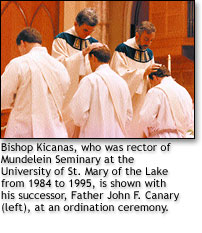|
|
Goodbye Chicago, hello Tucson
Bishop left his mark on archdiocesan seminary
 By Hilary Anderson By Hilary Anderson
SPECIAL CONTRIBUTOR
Before being named an auxiliary bishop of Chicago, then-Father Gerald F. Kicanas served for many years—and left his mark—on the seminary system of the Archdiocese of Chicago. Those who served with him at Quigley Preparatory Seminary South and Mundelein Seminary remember him as a multi-talented, energetic and caring person with a phenomenal memory for names.
Those who know him even longer recall the bishop’s own days as a young seminarian
“He is someone you’d like to know,” said Father Richard Bulwith who attended the seminary with Bishop Kicanas and currently serves as director of Catholic Charities Cooke’s Manor.
“He was very talented in drama and participated in most of the plays while we were in the seminary. He has transferred that talent to giving homilies.”
The current rector of the archdiocesan seminary agrees.
“Gerald Kicanas is a great preacher,” said Father John Canary who is rector/president of the University of St. Mary of the Lake/Mundelein Seminary.
“Even to this day some of the faculty and students remember his homilies. Once he preached a homily [at Christ the King Church] with a bag over his head to get people’s attention. Another time he caught everyone’s attention when he began writing checks and handing them out during his homily to emphasize the spirit of generosity.”
Along with Bishop Kicanas’ gift of preaching goes his gift of teaching, said Canary. “He also has a way of helping people understand his message. He is able to adapt his material to the individual or class he is teaching.”
Father Ray Webb—a faculty member at Mundelein Seminary—describes the bishop’s talent in yet another way: “He knows how to connect with people.”
All who know Bishop Kicanas mention his ability to remember names. They say it is nothing short of phenomenal.
“One of his greatest gifts is remembering names and something about each person he meets,” said Bulwith. “He even remembers the names of young people he is confirming.”
This talent helped Bishop Kicanas while he served as rector at Quigley South, 1978-84. “He knew the names of all 800 students and the 1,600 parents,” said Webb. “That made a big difference in the attention and help he got from them.”
Perhaps less known but even more important is Bishop Kicanas’ concern for children, those with disabilities and struggling families, according to Webb.
“For many years he squeezed in time in his busy schedule to serve as chaplain for the Audy Home, in addition to his full-time job as a Mundelein Seminary faculty member. He also made a lot of quick visits to those who were struggling with disabilities.”
Webb added that Bishop Kicanas is not one to flee from problems.
“If someone has a gripe or problem, he goes right to them looking for resolutions rather than avoidance.”
The bishop also has a reputation for being a great administrator.
Father August Belauskas, vice rector and director of pre-theology at Mundelein Seminary, cited some of the bishop’s accomplishments as rector there, 1984-95.
“He really expanded our seminary by inviting other dioceses to train their young men here,” said Belauskas. “He also went international and consequently our population is more diverse. We now have students from 46 dioceses and several countries studying here.”
Belauskas said that Bishop Kicanas initiated the requirement for seminarians from the Chicago Archdiocese to learn Spanish and started the development department.
During his administration, the Center for Development in Ministry was located there.
“It is used to train many in the archdiocese including deacons, catechists and lay people working in other ministries,” said Belauskas.????
“We must not overlook the fact that he was responsible for making many physical improvements around the seminary.” These included everything from tuckpointing the buildings to improving the landscaping and putting in new roads around the campus.
Another thing Bishop Kicanas is known for is his seemingly boundless energy, exercising and “different” diet.
“He is very disciplined. His no-fat, no-meat diet is legendary. He eats sparingly and exercises five times a week,” said Webb.
“He has a tremendous amount of energy,” added Canary. “It was common to see him run around the lake early in the morning, then come into chapel for prayers, followed by his full work day and then a walk through the building in the evening to say hello to everyone. People are not sure just how he survives on his unusual diet. Some refer to it as ‘twigs and grass.’ “
Those who know Bishop Kicanas will miss him.
“He is a beloved person,” said Canary.
But Webb looks at the bishop’s new job in another way.
“The Tucson area will be a new challenge for him. I think Arizona will provide more of the outdoors, wilderness and sunsets he so loves. We’re not losing a friend. We’re gaining another place to visit.”
Front Page | Digest | Cardinal | Interview
Classifieds | About Us | Write Us | Subscribe | Advertise
Archive | Catholic Sites | New World Publications | Católico | Directory | Site Map
|
|





